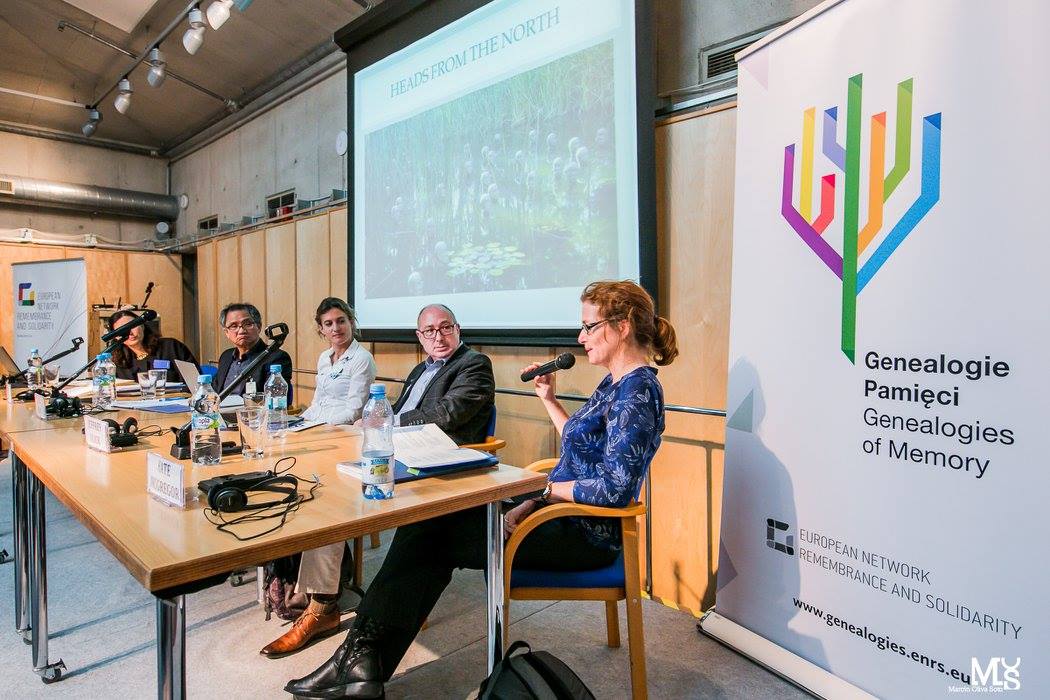International Academic Conference, Warsaw 17-19 March 2016, University of Warsaw Library
From 17 to 19 of March, the Regions of Memory conference was held at the University of Warsaw Library, resulting in three days of inspiring lectures and fruitful discussions between academics from all over the world.
The conference was a part of the Genealogies of Memory project, run by the European Network of Remembrance and Solidarity since 2011.
This conference revisited the regional structuration of memory, an issue that was discussed in an earlier meeting within the “Genealogies of Memory” project in 2012. The conference aimed at gaining further insights into the construction of memory regions understood as discursive arenas of memory that are above the level of the nation-state but not fully universal. One of its aims was to consider the ways in which public debate, digital discourse, written narratives and visual representations shape constellations of memory that transcend the nation-state.
One of the central concerned topics was the assessment of the term ‘regions of memory’, as a variety of evidences show that the connotation of the term ‘region’ with a specifically geographically determined area is insufficient for the ‘hybridity’ these memory-regions can actually have. Kate McGregor for example,Associate Professor at the Melbourne University and a historian of Southeast Asia with particular interests in the topics of history, memory, violence and transnational political history,showed a case how Indonesia during the Peoples Tribunal for the 1965 Violence could be connected to multiple ‘memoryscapes’, surpassing geographical and cultural boundaries.
From all kinds of angles and approaches, sociologists, anthropologists, historians and political scientists also discussed a wide variety of topics: the migration of memory and memory-templates, the existence or non-existence of a ‘collective memory’, inter-connectedness of all kinds of memories, the fragmentation of trauma, and methodologies. Brady Albrand, a PhD candidate from the university of Queensland, talked about ‘prosthetic memories’ from white South-Africans who migrated to Australia. Jie-Hyun Li, professor of the Department of History at Hanyang University (Seoul) since 1989, made global comparisons between Polish and East-Asian ‘narrative-templates’, and Derek Sayer, Professor of Cultural History at the University of Lancaster (UK) and Professor Emeritus (Canada Research Chair) at the University of Alberta, Canada, questioned with his ‘Texas-Berlin’ essay if there is such a thing as a collective memory at all.
A few examples of other debates where the existence of a ‘Post-Soviet Memory Region’, consisting of interesting contributions by Rasa Baločkaitė and Nelly Bekus, ‘How Policies construct Memory’, discussed by Aline Sierp, Sara Correia and Alina Thiemann, about respectively the ‘ fluid boundaries’ of the European Union, English Muslims and Srebrenica and the complicated Romanian remembrances of 23 August. ‘The Fragmentation of Trauma: Memories of Mass Violence between the Global and Local’ was discussed by Sławomir Kapralski with his contribution about the Holocaust memory-discourse in Poland, and Angeliki Mouzakiti contributed to this subject with her research about Romanian memorial sites on the pogrom of Jews in Iaşi in 1941.
Other contributions were made by Ann Rigney, Jeffrey Ollick, Jens Boysen, Sławomir Kapralski, Angeliki Mouzakiti, Younes Saramifar, Marcin Wróbel, Malkhaz Toria, Elizabeth Johnstone, Irena Šentevska, Małgorzata Głowacka-Grajper, Azra Junuzovic, Daniel Wutti, Andreas Hudelist, Burkhard Olschowsky, Simon Lewis, Małgorzata Pakier and Joanna Wawrzyniak.
A thanks to all the organizing partners who helped the European Network for Remembrance and Solidarity successfully create this conference: the Institute of Sociology at the University of Warsaw, the Institute for East European Studies at the Free University of Berlin, the Federal Institute for Culture and History of the Germans in Eastern Europe, as well as the Federal Government Commissioner for Culture and the Media (Germany), Ministry of Culture and National Heritage (Poland) and the Ministry of Human Capacities (Hungary).
